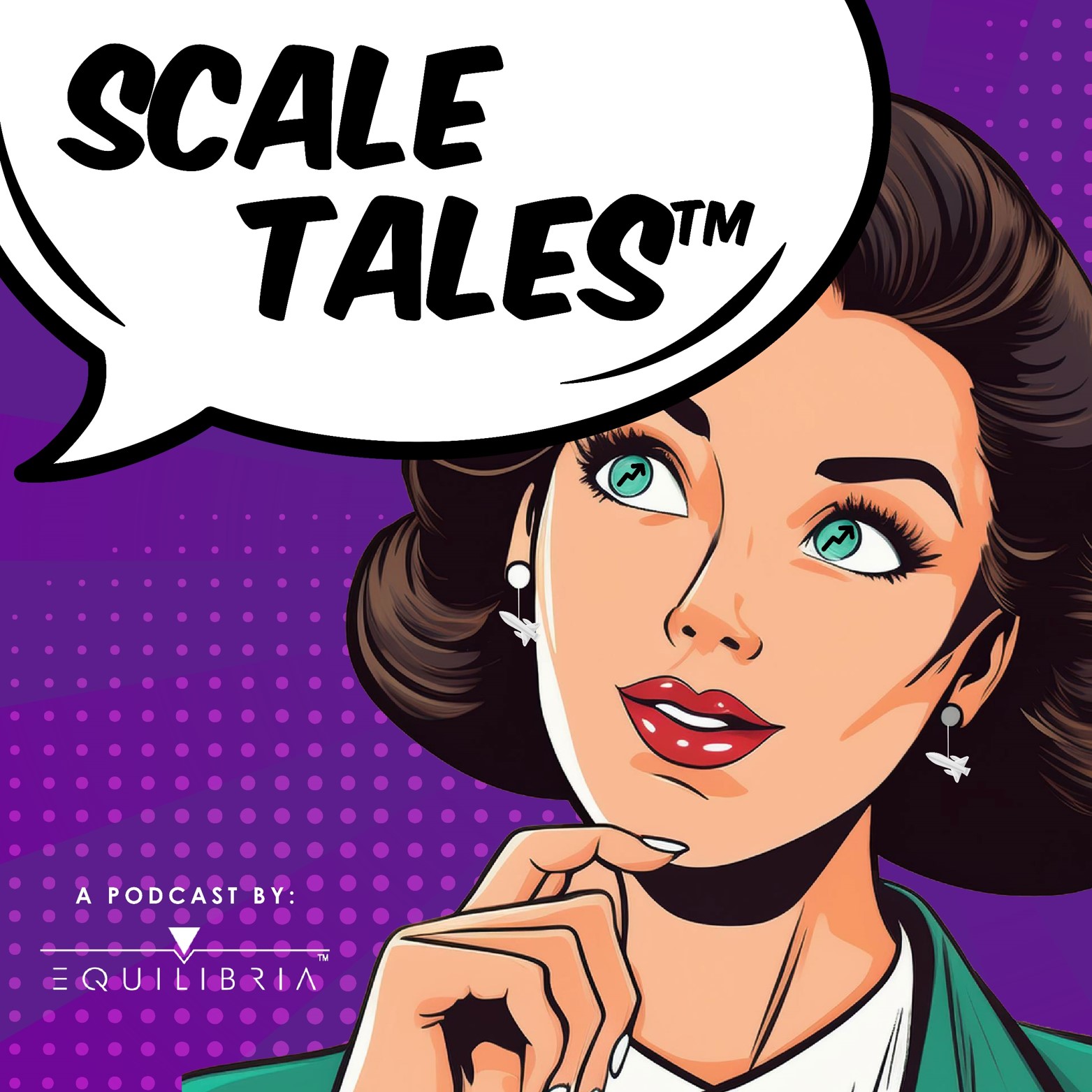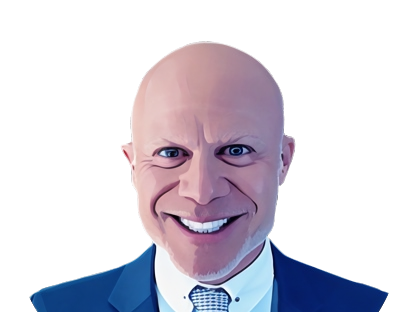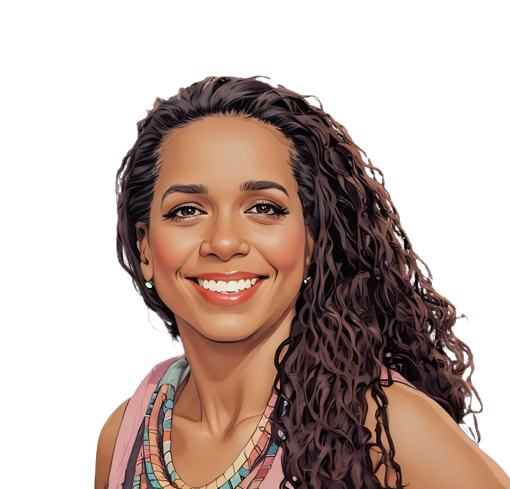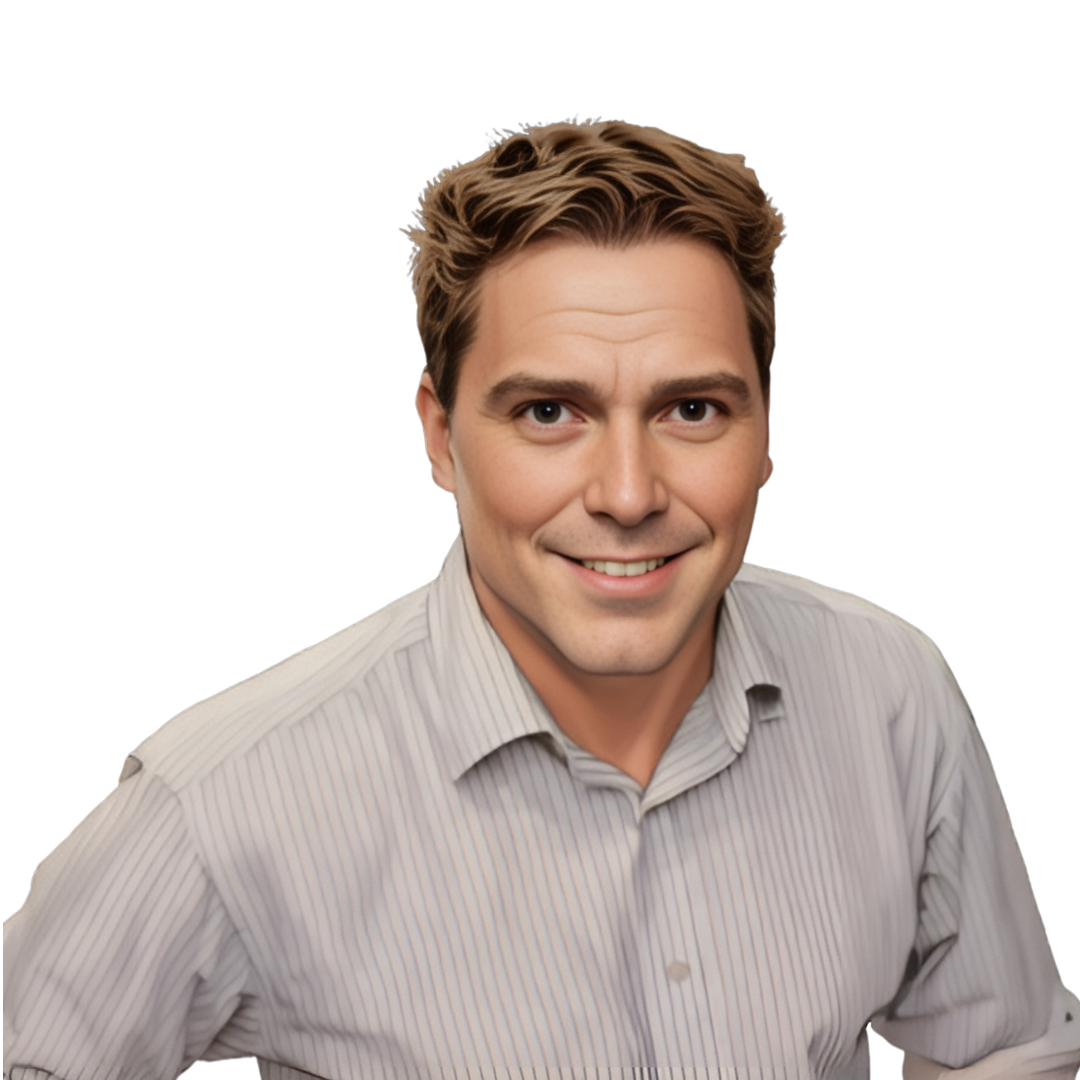Transcript
This episode is brought to you by Equilibria, Inc. Equilibria provides training to assist fast-growing companies in documenting and improving their key processes for maximum operational performance. Visit EQBsystems.com to stop the chaos of fast growth and start flowing today! EQBsystems.com.
Welcome to Scale Tales – the business storytelling podcast where entrepreneurs, executives and experts share firsthand accounts of those magical moments when they achieved something bigger than even they could have imagined.
I’m Alicia Butler Pierre and I’m particularly excited about this episode because it features someone who has become a dear friend. As much as we’ve talked about business, I had no idea of her backstory, the major obstacles she’s overcome in starting her company, and the incredible impact her company has made in advancing the heads, hearts, and souls of the people she works with in large organizations.
This is Ep. 16: How Jahnavi Gurjer Built a Top 10 Change Management Company and Scaled Impact to Over 100,000 People
Hi, I’m Jahnavi Gurjer, co-founder of Vital Science Consults. I’m currently located in Bangalore, India. And this is my scale tale.
It started on a rainy evening way back in 2015, when I had made up my mind that I’m going to take a break from being this human resources head at a very large multinational organization. Now why did I need that break?

Because at that point I felt while I was very busy and I was earning really well, there was something within me that said I need to be more impactful. And that little voice led me to give up a position of power and seek something more useful. So, on the 1st of May, 2015, I commenced my entrepreneurial journey. The first thing I knew I wanted to do was to work with people. And that is the genesis of Vital Signs Consults.
Why the name Vital Science Consults? It was a very simple thing, like how we know if a person’s healthy. There are a few vital signs about the person, like the pulse, the temperature. Same way organizations also are living beings. And I felt that they had also some vital signs. Happy people, happy numbers, and overall happy customers. Now, these vital signs tell us if the company is healthy or not. So I said, why not I work in a team, build an organization that can make other organizations happy.
Today, almost nine years later, we are in the top 10 organized change and culture change companies in India. I have a small team. Most of us are women, but we serve a lot of the top 100 companies in India. They come to us most of the time because they want something to be done. But this something isn’t very tangible, nor is it very visible, but it doesn’t make them functional. For example, wherever there are frictions within people, and these frictions have an impact on processes which have an impact on the productivity and the performance of the company, they come to us.
So we are more or less like handymen or handywomen who dive deep into the gut of the organization and we unblock the organization. All systems have frictions. Some frictions are positive and some frictions are not so positive. India is a very competitive market. Everybody wants to race ahead of the other. But at the same time, it’s also important to understand that there’s the human element. And human beings are far more than just processes. They have emotions, they have feelings, and they have responses. Now, can all these be quantified?
Can all these be channelized in the right way? The answer is yes. But unless and until someone shows results, it’s very difficult for people to want to invest money in this. So I went around with my idea. I had started my company in 2015, and I was completely bootstrapped, I making just about enough to pay my vendors, to pay my team, and just to keep afloat.
So I went around to a lot of people and said, “I’m looking for partners. I’m looking for business mentors. I’m looking for anybody who can help me scale this company up.” And then that was a point when a lot of them said,
“I’m not sure what the returns are going to be.”
It was not easy because if you’re manufacturing soaps, you’re manufacturing cars, you’re manufacturing mobile phones, it’s very easy to show the quantum, and it’s very simple to show what kind of returns it would bear.

But I’m not saying I’m ensuring that your organization is going to have the most fabulous people. What am I working with? I’m working in a very niche space where I’m telling you that there’s a large number of people, they’re all working together. They’re small groups, large groups, individuals, everyone’s working together. But there are certain things which are unaddressed. It’s not going to make them dysfunctional now, but it is eventually going to make the whole organization dysfunctional. And this was my business pitch.
Jahnavi knew this would be a tough sell to an investor. Would her pitch work?
I know no sensible investor would want to invest any money in this simply because this isn’t something that is demonstrating any kind of return, nor is it demonstrating any kind of growth for a person. I didn’t give up. I was resilient. I continued working because I had so many setbacks. For example, I would almost get a contract to be signed to kickstart with a particular client, and we’d just be ready to start as of tomorrow.
And then comes something and says, we’re just going to put it on hold for a little while. Now, the minute somebody puts something on hold, I know my cash flow gets affected.
Some would describe these kinds of setbacks as the “cost of doing business,” but Jahnavi knew she had something worth exploring. And other people thought so too. The problem was, those other people were not interested in investing.
What am I supposed to do? Am I supposed to turn back and say, “Okay, I give up, I quit. There’s nothing great about it. I guess I failed,” but that isn’t me. I’m a very resilient person. So I said, “No! I’m just going to step back and if I can solution my clients’ problems, why am I not able to solution my problem?”
So that’s the point where I came back in and said, “I need to learn how to scale.” So I got myself a business mentor. There are a couple of questions my business mentor asked me. One of those questions was, What is it that you really want to do? And I was very clear. I want to monetize helping people. I want to monetize creating opportunities, and I want to monetize transformations.
These are very helpful, these sound good, but at the same time, I want people to understand that there’s a value attached to it. So there I go, back again, set in my business plan. And this time, when I had to rewrite my business plan, the story was very different. Because for the very first time, I started putting numbers ahead of my ideas. The mistake I had made for about five years was romanticizing my ideas. I was very excited about what I was doing. I put all my energy into it, and I never looked into the numbers.
But once she did start looking into the numbers, it gave her a level of clarity that was missing before. Jahnavi hit paydirt!
And for the very first time, I got a partner on board, a private equity investor who came in and said,
“Okay, now that these numbers look promising, talk to me about how this market’s going to grow in India.”

And that’s when I pulled up a globally standardized economic survey report, and shared it with this Investor, and said, “One in every 10 members in every organization currently needs support, needs attention, and not from a way that they need help or they need clinical interventions, but what they need right now is to be heard. What they need right now is for them to be unblocked. And that’s the part that I’m going to be working on at this stage.”
Armed with solid data, Jahnavi was shocked at the private equity investor’s response to her revised business plan.
I must say, this person was not just generous, but this person was also very courageous. He said,
“Alright, I’m going to invest about maybe 10% of what you need for the first 90 days. I want to see what kind of progress you’re going to make. And based on that, let’s see how we’re going to go forward.”
So here was something. Somebody was lending me a hand, but not an entire thing, and saying, “Okay, come 10 steps forward. And let’s see what we can do. And if this really works out, we’re going for bigger money after this.”
And it was good for me. I am an eternal optimist, so even a small ray of hope is good enough for me to survive. So once my plan was completely approved, I went back to the banks and spoke to the bank managers, spoke to everybody involved, and we were in a better position. My team and I sat down and we actually created our services. We said what we are not going to be – we’re not going to be a hiring firm, we’re not going to be a firm doing full blown human resource services, or we’re not going to be a firm that is offering a cookie cutter model to any of our clients.
What we are going to be is an empathetic listening firm that is going to be billing the hours in giving systemic solutions or in diagnosing and designing systemic solutions for better processes and better people. And so we developed our own model around it and we worked on this model and starting from one client, we went on to work with about 7,500 people in the first year, and in the second year it went on to 25,000 people. Today, we have touched the lives of 100,000 plus people as we close October 2024.
Wow! Servicing 7,500 people to over 100,000 in a little less than 9 years is simply amazing and, is a testament to the power of Jahnavi’s resilience! Coming up after the break, she’ll explain more about what her company does and a unique tool they’ve developed to scale their impact even more.
Some small businesses fail not from the lack of customers, but from too many. When your business receives positive publicity, it’s exciting! The spotlight attracts more customers and the cash flows in. But too much growth too soon can be catastrophic especially if your organization lacks the business infrastructure to support this growth.
Behind the Façade: How to Structure Company Operations for Sustainable Success is a book that introduces a proven framework for building business infrastructure. The book is structured into six relatable stories of entrepreneurs who apply this framework, giving you an inside look at how they solve their fast growth issues and how you can too! Pick up your copy today at ScaleTalesPodcast.com. ScaleTalesPodcast.com.

Jahnavi Gurjer is the co-founder of Vital Signs Consults. They rank in the Top 10 of Culture Change organizations in India, but it’s hard to believe her organization almost never happened. Thanks to some craft data collection, a powerful vision and mission backed by tenacity, they’ve now serviced over 100,000 people. What exactly do they do for people? And how has this led to their scale? Listen closely as Jahnavi explains.
Specifically, we diagnose people as microcosms of a large organization system. And we connect these people as to how they predictively behave within the larger organization culture and how this could actually impact the organization. So while we take the support of the organization’s values, we connect this person as a journeyman in the organization’s growth process.
So it’s not just an isolated event like coaching, nor is it maybe a nice, more energetic event like a training or a workshop. But what we do is design a fingerprint, customized journey for the individual, but within the ecosystem of the organization that is investing in this individual. So while maintaining personalization on one hand, we ensure complete alignment, to the largest extent of the evolution of this individual in the organization. And this is completely monetized and the organization sees the return on it.
Interestingly, Jahanvi credits the X-matrix with giving her the ability to better communicate returns to her clients. The X-matrix is a strategic planning tool we previously covered on our sister show, the Business Infrastructure podcast.
We use that today in our organization as a guidance framework to say, “Okay, what is our priority? What is the client’s priority? How are we going to be able to change what we do and show the value of what we do to the client, not just a real good fuzz, and say, ‘Hey, we’ve done this great teamwork, off-site or intervention for your team. And I’m sure all you people are feeling great about themselves.’” No, very, very accountable.

One of the big changes that I brought in was stop the big talk. No jargon, no fluff. And a very clear principle in the organization that I lead today is we will not make our clients pay for our inefficiencies. So we don’t pad up our costs.
We look at what is the value the client is going to get by our work and what is the price of the trust that they have invested in us? Because they’re really bearing everything to us and they share their most confidential details with us. Therefore, maintaining the confidentiality of the client at all costs is sacrosanct for us.
And making sure that our inefficiencies aren’t being billed to the client, these are two of the most important values. Having committed to this, all of my work to date has come by word of mouth. I’ve worked with some of the largest organizations, with some of the largest leadership teams globally who are present in India, and some of the smallest micro-organizations.
And one common thing that I’ve noticed across is that one, people are extremely ambitious, and two, at the same time, they’re extremely afraid if they’re good enough and if they can pull it off. There is ambition, there’s opportunity, and there’s at the same time the feeling that I may not be good enough.
In my opinion, all my customers need systemic nudges done in a scientific manner. That allows them to find their pathways. They already know their job, they know their skills. They’re brilliant at what they do. But they don’t know how to get there. That feeling of them being uneasy is what we work at easing them down and making sure that this is accounted for.
And that’s my scale tale!
And what a tale it is! Jahnavi’s formula for scaling impact, team, and revenue without sacrificing core values is rooted in an interesting business model based on compassion, empathy, and science.

When I worked in two large engineering and manufacturing organizations, I was always successful, but I always thought there was something more I need to do to create impact. And when I was doing that, I realized that there’s a combination of the head, heart and soul. And all three, it has to come together, the head, heart and hand. Couldn’t put the soul because it couldn’t measure it. But what is the head thinking?
What is the heart feeling and what are the hands doing? And I always felt when there is congruence between the three, there will be a lot more positive impact. And then one can work unsupervised and still do a brilliant job. I wrote this model down many times, many times over. When I was founding Vital Signs and I was in the process of building this company, I would shamelessly discuss this with my team.
Many of them must have got bored and quit as well. But I would discuss this because I wanted to see what their feedback was. I would discuss this with anybody I met. But eventually I was very convinced that what I think, what I feel, and what I do if there’s alignment in the three, then if I’m competent, obviously I would do a brilliant job. And this is the model that I built – people result strategy as a triangle. And if they keep working with each other, all these three moving parts are working in the same direction, we’d be able to achieve the results we want.
And I also had this reality check that the goalposts are not going to be the same for people. Life happens and people change and when they change, their goalposts change. And hence it’s very natural that their attention also changes. So the entire thing was our organizations capable of capturing the life changes of these lifers in the organizations, what we call as loyal people and our organization sensitive enough to go with the change of the people. And the sad state of affairs. More often than not that organizations are more or less static. What really changes is perhaps some structures and maybe some process improvements, but they somehow fail to capture the life changes and the priority changes of people. And that’s where I think my model clicked.
Jahnavi’s business model clicked because it recognizes that people, and what motivates them is not static, but changes just as an organization changes and evolves over time. Considering this, I wondered what’s next for Jahnavi and Vital Signs Consults.
I believe wherever there are people, there is going to be an opportunity for Vital Signs to go forward. And I’m looking for partners globally who would support this dynamic nature of change and keep it alive in organized spaces. Currently, my team and I are doing a very exciting project in incubation where we’re looking at how can we measure compatibility of people working on projects with the compatibility of the organization?

One of the things that I have noticed, there’s lots of organized change management done by amazing people across the world, and there’s a lot of process excellence in the world. But when groups come together to work on these projects, there is a personality that the group develops. We are working on developing a psychometric tool that can create a compatibility index that enables and helps project managers to select teams that are more or less complementary and compatible for the project success.
Because 90 to 93% of the times projects fail because of the lack of communication and alignment between the minds of people, not between the technical areas of expertise of people. I’m not saying they have to hire clones of each other or people who just echo each other.
I’m saying there is absolutely room for diversity, but diversity with knowledge, so that the project manager knows what the project manager should be doing and how the project manager should be working with each individual and how the project manager can bring them together for the success of the project.
I’m looking forward to seeing this compatibility index. It’s one of several resources Jahnavi wants to share, including her podcast.
I have a podcast that I host and I invite people to hear people’s stories, which are different. I want to appeal to the young people across the world that there is no one fixed, mandated pathway to reaching your goals.
Several people have several pathways. I invite people, young people, not to give in, and not to give up too quickly, because the pieces of the puzzle will come together. Sometimes maybe a tad bit delayed, but they will come together. So just hang in there and wait for it. Come in and listen to Clarity. C-L-A-R-I-T-E-A is a podcast that isn’t about business. This isn’t about the work that I do.
It’s a podcast about visible emotions and emotions that are supposed to be suppressed. It is about talking about those daily emotions we feel. It’s something that pulls us down or leaves us feeling lost, but we’re never able to put a finger on it. But by talking about these small little emotions, I think it enables people to become more vulnerable and hence find comfort in being who they are. And that’s something that I invite people to see.
But more importantly, I want to thank you for this, Alicia. I think what you’re doing in Scale Tales is amazing. I want to invite people to read your book, and I also want them to listen to your podcast on business infrastructure because there’s just so much truth and authenticity in what you say, because I can literally visualize what you’re saying, and I can see how it gets implemented on the ground. And you have made a huge difference by sharing your knowledge to my business, and I want to acknowledge that openly.
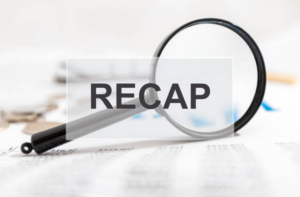
Wow, Jahnavi, thank you so much! I was not expecting that, and I appreciate you so much for that public acknowledgement! This why we do what we do on this show and in our other work. We want to make information for building sustainable businesses accessible to the masses. Here’s a quick recap of some lessons Jahnavi taught us through her scale tale:
1. Understand the psychographics of your target market. What motivates them? What are their behaviors? Jahnavi knew that her target market of people working in large companies are doing so in highly competitive environments that will naturally lead to friction. She leveraged that knowledge as a baseline for her mission.
2. Speaking of mission, be clear on what your mission is. Remember, she said that her business mentor asked her a simple question, “What is it that you really want to do?” Knowing the answer will give you clarity, direction, and ultimately sustain you during tough times.
3. Beware of “romanticizing your ideas.” Have tangible numbers to back your mission and vision. This also gets investors’ attention.
4. Consider using the X-matrix as a tool to develop your strategic plan.
5. Formalize your core values to practice what you preach and teach. Some of Jahnavi’s core values include not passing along inefficiencies to her clients and
maintaining client confidentiality.
6. Challenge yourself to develop a tool you can use to measure and communicate value and progress for your clients. For Jahnavi, it’s a compatibility index.
I met Jahnavi at a Thinkers50 event in London, England in 2023. Ever since, we’ve talked about collaborating and so I’m so glad we could make this episode happen. Jahnavi, thank you, from the bottom of my heart, for sharing your scale tale with us. Your story is as remarkable as it is inspirational.
You can learn more about Jahnavi, her company’s compatibility index for project managers, her podcast, that X-matrix tool she referenced, and more in this episode’s show notes. Visit ScaleTalesPodcast.com. Again, that’s ScaleTalesPodcast.com.
Thank you for listening! If you learned something valuable from this episode, please leave us a five-star rating and review wherever you’re listening.

I’m Alicia Butler Pierre and I produced and narrated this episode. Additional voiceover by Clarence Levy III. Audio editing by Olanrewaju Adeyemo. Music production and original score by Sabor! Music Enterprises. Video editing by Gladiola Films. Show notes by Erika Ve Revilla.
You’ve been listening to Scale Tales, a podcast by Equilibria, Inc.













